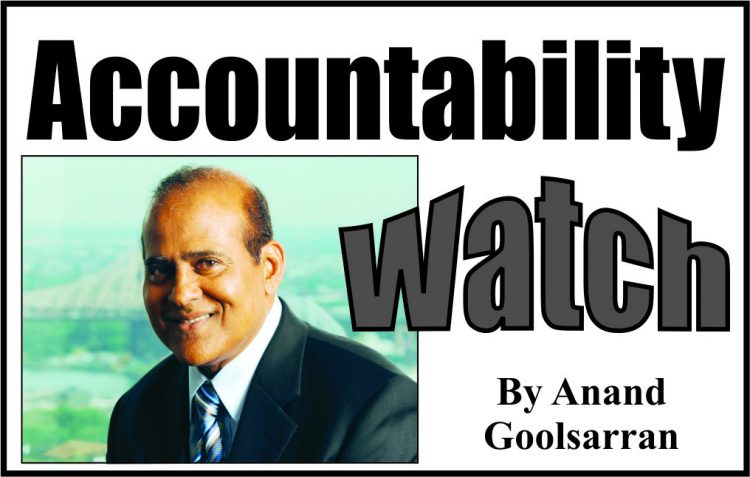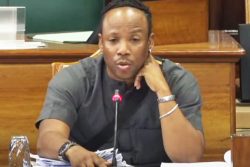 In our last two articles, we commenced highlighting the significant issues that we covered in our Accountability Watch column in 2024. These relate mainly to budgetary matters, public procurement, natural resource management, corruption-related issues, and other related matters. So far, we have dealt with budgetary matters, public procurement and natural resource management.
In our last two articles, we commenced highlighting the significant issues that we covered in our Accountability Watch column in 2024. These relate mainly to budgetary matters, public procurement, natural resource management, corruption-related issues, and other related matters. So far, we have dealt with budgetary matters, public procurement and natural resource management.
On Friday, the Minister of Finance will present to the National Assembly the 2025 Estimates of Revenue and Expenditure. We look forward to his assessment of the performance of the economy in 2024 and the proposed budget measures for 2025. Judging from the results of the execution of the 2024 budget at the end of the first half year, the budget appeared over-ambitious. This is especially so as regards infrastructure development works where only 24.5 percent of the overall budgetary allocation of $666.2 billion was expended. In this regard, we cautioned against undue haste to incur expenditure, especially close to year end, in order to exhaust budgetary allocations.
To ensure compliance with the Fiscal Management and Accountability (FMA) Act, all unspent balances should be refunded to the Consolidated Fund, and the affected programmes and activities should be re-budgeted for in the new fiscal year. Years ago, it was the practice for staff from the Audit Office to initial in green ink the cash books and votes ledger at the end of the last working day of the year to prevent additional entries being made and backdated to 31 December. It is not clear what procedures are currently being followed to ensure strict compliance with the Act.
One contentious issue relates to the treatment in the Estimates of withdrawals from the Natural Resource Fund (NRF). Section 16(2) of the NRF Act restricts the use of withdrawals to finance only: (i) national development priorities, including any initiative aimed at realizing an inclusive green economy; and (ii) essential projects that are directly related to ameliorating the effects of a major natural disaster. The use of the word “only” suggests that the proposed expenditure must be clearly identified in the Estimates. Considering this requirement, it appears inappropriate for the withdrawals to be treated as current revenue, comingled with internally generated revenue, to meet current expenditure, as has been the practice since 2022. We hope that for the 2025 Estimates there will be a change in arrangement to satisfy the requirements of the Act, with clearly identified projects to be financed from the NRF withdrawals.
Additionally, Section 16(1) provides for the maximum that may be withdrawn from the Fund in any fiscal year not to exceed the total withdrawal from the Fund approved by the Assembly and must be in accordance with the ceiling set in the First Schedule plus any amount required for emergency financing. This implies that the Assembly must first approve of the withdrawals before they are incorporated in the proposed annual budget, a requirement that appears to have been overlooked since 2022.
As regards natural resource management, we
discussed the 2021 annual report of the Guyana Extractive Industries Transparency Initiative (EITI). We are disappointed that four of the seven sets of recommendations that the Independent Administrator made in past reports, four still remained unimplemented while the remaining three were reported as on-going. The 2022 Guyana EITI report has since been issued and will be the subject of a later column.
We also discussed the audit of Exxon’s pre-contract recoverable costs covering the period 1999 to 2017 undertaken by the UK firm, IHS Markit. The audit identified US$1.678 billion in recoverable costs of which US$214.4 million, or 12.8 percent, was not eligible or lacked supporting documentation. In relation to the audit of post-contract recoverable costs for 2018-2020, which was undertaken by a local consortium of auditors, the auditors identified $7.435 billion in recoverable costs of which only US$65.194 million, or 0.88 percent, was considered ineligible. However, our assessment was that not enough work was done to enable the auditors to draw the conclusion that the amount shown as recoverable costs were in accordance with the Petroleum Sharing Agreement (PSA), except for certain items contained in the auditors’ report.
Notwithstanding this, as well as the fact that the auditors had not issued their final report, the consortium was awarded the contract for the period 2021-2023. According to the advertisement, a key requirement is for the bidding firm, along with its partners (local and foreign) combined, to have completed at least three similar assignments during the past seven years. The Minister of Natural Resources had also stated that it was the Government’s intention to have the contract go to a local consortium, in partnership with international firms, so as to build local capacity. We, however, felt this should have been a long-term goal since no auditing firm currently operating in Guyana, including the consortium, would have met this requirement. It would appear that the above requirement was tailored to enable the consortium to win the award. In the interest of ensuring transparency and to ensure that the highest quality of audit is performed, international firms, such as IHS Markit, should have been allowed to bid for the contract.
In today’s article, we continue our summary of the main issues that we dealt with in 2024.
Corruption-related issues
Guyana’s standing on the Corruption Perceptions Index
In February-March 2024, we carried five articles titled “Despite strong constitutional, legislative and regulatory systems to fight corruption, meaningful progress continues to elude us”. We cited Transparency International’s 2023 Corruption Perception Index where Guyana scored 40 out of 100, the lowest in the English-speaking Caribbean. This was despite the various anti-corruption mechanisms in place over the years. These include:
(a) Creation of the Guyana Revenue Authority in
1996
(b) Guyana being a signatory to the Inter-American
Convention Against Corruption (IACAC) in
1997.
(c) Passing of the Integrity Commission Act in
1997.
(d) 2001 constitutional amendments for the
establishment of the Public Procurement
Commission and to secure the independence of
the Audit Office of Guyana.
(e) Enactment of the FMA Act 2003.
(f) Enactment of the Procurement Act 2003.
(g) Enactment of the Audit Act 2004.
(h) Ratification of the United Nations Convention
Against Corruption in 2005.
(i) Passing of the Anti-Money Laundering Act in
2009 and its subsequent amendments.
(j) Establishment of the now disbanded State Assets
Recovery Agency in 2015.
(j) Establishment of Guyana’s Extractive Industries (k)
Transparency Initiative in 2017.
(l) Enactment of the Protected Disclosures Act
2018.
(m) Enactment of the now repealed NRF Act 2019.
(n) Enactment of the NRF Act 2021.
Guyana Revenue Authority and the Integrity Commission
We discussed each of the above on previous occasions. We argued that the GRA needs to intensify efforts to conduct of “lifestyle” audits and arbitrary assessments to ensure the completeness and accuracy of tax returns of individuals, unincorporated entities and companies, considering the extent of unexplained wealth that is being flaunted in front of our very eyes. The Integrity Commis-sion needs to go beyond monitoring the submission of annual financial returns of Ministers of the Government, other parliamentarians and senior public servants and, in collaboration with the GRA, critically examine the returns to ensure there is no mismatch between the declarations and the observable lifestyles of the individuals. The Commission also needs to utilize its powers to initiate prosecutions against persons who have failed to submit their declarations and who have violated the Code of Conduct contained in the Integrity Commission Act. For example, the Jamaican Integrity Commission reviewed the financial declarations of the Prime Minister and found apparent omissions in relation to his declared assets and liabilities.
The Auditor General’s office
We continue to bemoan the lack of effectiveness of the work of the Audit office as the Supreme Audit Institution and the watchdog of public accountability. This is despite the 2001 constitutional amendment to strengthen the Auditor General’s independence as well as the provisions in the Audit Act that delink that Office from the Public Service and provide it with greater autonomy and flexibility to discharge the Auditor General’s mandate. A review of the Auditor General’s reports over the years reveals a significant lack of comprehensiveness, superficial treatment of certain important issues, and unevenness of audit examination and reporting
A number of performance audits were also carried out. However, the Public Accounts Committee (PAC) is yet to examine the related reports. The Committee is five years in arrears in its examination and reporting on the public accounts. The change in the number of PAC members constituting a quorum has also stymied the PAC’s work, instead of expediting it.
Special Organised Crime Unit
The Special Organised Crime Unit (SOCU) was established in 2014 based on a recommendation of the Financial Action Task Force. It is the investigative arm of the Financial Intelligence Unit. However, to date there has been no evidence of successful prosecution involving public officials alleged to have been involved in financial crimes. According to an article by Ralph Ramkarran dated 21 February 2016, SOCU had 858 pending cases on hand as at this date The independence of Unit from the Executive has been called into question on several occasions.
State Assets Recovery Agency
One of the provisions of the UNCAC relates to freezing, seizure, and confiscation of proceeds of crime or property, including income from such property. It requires parties to the Convention to take measures to permit its competent authorities to freeze or seize property based on an order issued by a court or competent authority, if there are sufficient grounds for doing so. It is against this background that the State Assets Recovery Unit was established in 2015, backed subsequently by legislation in 2017. However, upon the change in Administration in 2020, the State Assets Recovery Agency was disbanded, thereby leaving a significant gap in the fight against corruption.
Whistleblower protection
A key provision of the IACAC relates to creating, maintaining, and strengthening the system to protect public servants and private citizens who in good faith report acts of corruption to the relevant authorities. However, it took 22 years for legislation to be passed to give effect to this important provision that is so vitally necessary in the fight against corruption.
Guyana’s Protected Disclosures Act 2018 was eventually passed in the Assembly on 18 January 2018 and assented to by the President on 12 February 2018. The disappointment, however, is that six years on, this important piece of legislation aimed at assisting in the fight against mismanagement, corruption, and unethical behaviour, is yet to be operationised via an order from the Minister of Legal Affairs.
Public procurement and contract awards
We identified 12 areas where there were procurement leakages over the years and had estimated that the extent of such leakages was in the order of at least 20 percent of the total procurement expenditure. In other words, for every $100 we spent on procurement, we received $80 in value only. Considering that our assessment was undertaken some ten years, the extent of leakages may be even higher today. Public procurement is one of the key areas that influences a country’s score and ranking on the CPI.
To be continued –








